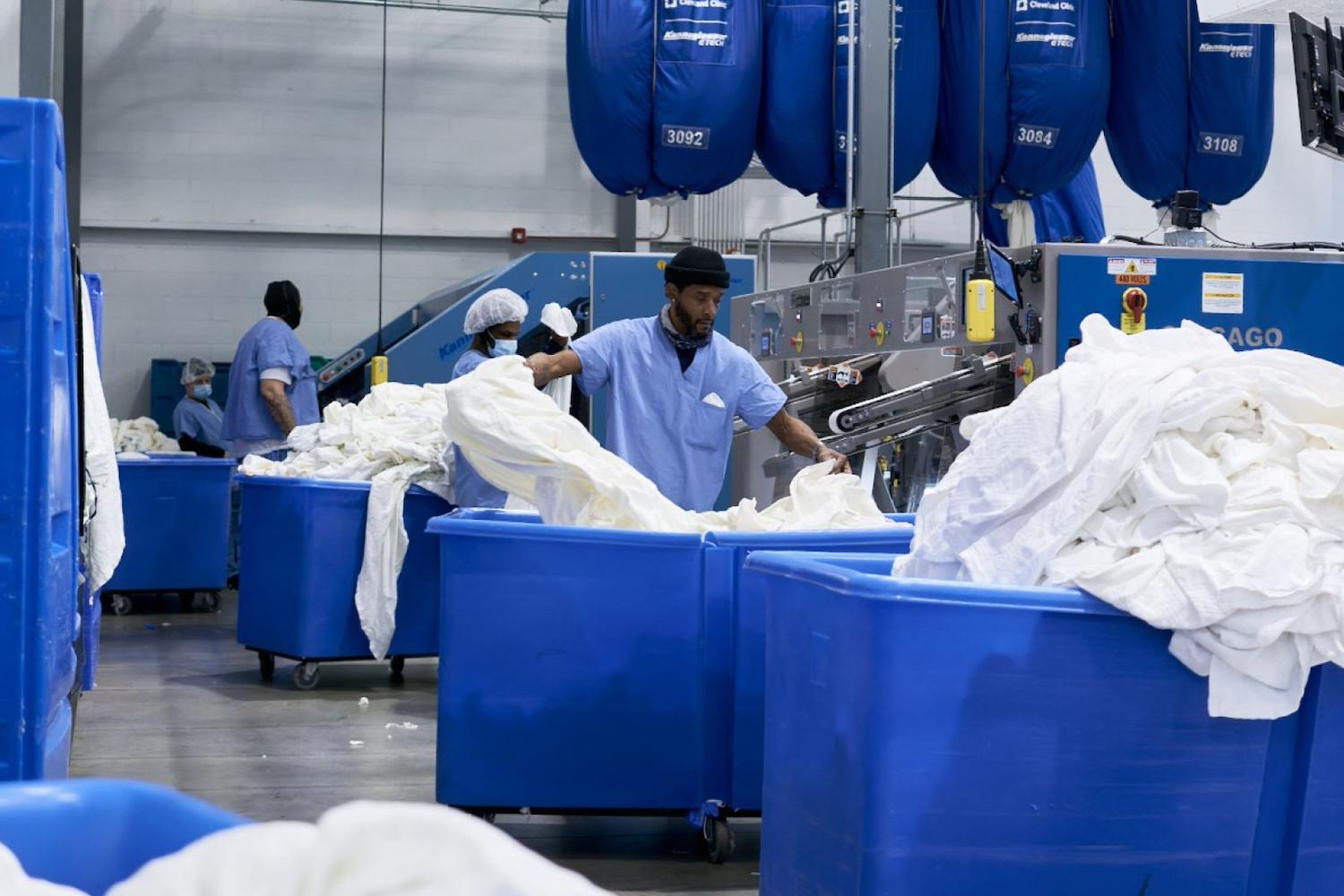
Evergreen Laundry Cooperative runs two facilities in Cleveland's Glenville and Collinwood neighborhoods, and the vast majority of the employees are Cleveland locals. (Image courtesy of Evergreen Cooperatives.)
An innovative business model is creating long-term wealth-building opportunities for residents of Cleveland, Ohio. The Cleveland-based nonprofit Evergreen Cooperatives, with support from several local institutions, operates a network of cooperatives that position employees to become owners, too.
The cooperatives do not depend on external investors. Evergreen Cooperatives holds voting rights and control, preventing buyouts or diluting the employees’ ownership, John McMicken, the nonprofit’s CEO, told TriplePundit. The cooperatives also use a profit-sharing model that gives employee-owners 80 percent of the annual profits. The aim is for each employee to receive $10,000 a year from profits — a quarter of which is paid as a cash bonus and the rest is set aside in an account until they retire or leave the cooperative. Employee-owners benefit from having steady employment close to home, shared profits and equity.
The cooperatives are been built from the ground up or converted from traditional business models. Evergreen Cooperatives acquires small to medium-sized businesses from owners who want to exit or retire and transitions them to the employee-owned model, allowing existing employees to have equity in the business. For new employee to become owners, they must complete one year of employment, meet performance standards, and receive approval from the existing owners to purchase equity.
The nonprofit launched its first cooperative, Evergreen Cooperative Laundry, in 2009 in the Glenville neighborhood. It built the business from the ground up, including purchasing and renovating the buildings. The laundry cooperative expanded its operations in 2018 with another facility in Cleveland’s Collinwood neighborhood, this time under a new model after winning a contract with the nonprofit medical center Cleveland Clinic. Called an anchor-supported model, the clinic owns the laundry facility and contracts Evergreen Cooperative Laundry to run it and provide laundry services to the clinic, university hospitals and assisted living facilities. The contract, which includes cleaning all the linens, bed sheets, and gowns, provides a reliable, steady supply of business.
Now, 80 percent of the laundry business is owned by the employees, according to Evergreen Cooperatives. In 2023, the business generated $25 million in revenue, $1.5 million of which was distributed as profit to the employee owners, according to the National Association of Development Organizations.
Workers say one benefit of working at the laundry cooperative is that it employs people from the neighborhood. “We're right in the neighborhood. We put a big sign up, and sometimes people just walk up and say ‘Hey, can I put in an application?’” Carla Beasley, who works at the Glenville facility, said in a Rutgers University case study in late 2022. “Some people walk to work.”
To support its cooperatives and the communities they operate in, one of Evergreen’s priorities is training entry-level workers to become managers and leaders. Many of its employment positions are entry-level and require no previous experience. From there, Evergreen provides training in different parts of the businesses’ operations, like human resources, accounting, governance and financial literacy.
The cooperative also opens up job opportunities to community members who may face barriers to finding employment elsewhere. Around 20 percent of employee owners are people who were formerly incarcerated, according to the case study.
Not all businesses under Evergreen’s network have seen such success, and some are no longer a part of the network. “These employee-owned businesses are all for-profit businesses competing in that small, mid-sized business space with many other similar businesses," McMicken said. "While there's a very clear mission behind the work that we do on any given day, these businesses have to be very competitive."
But where they do succeed, community members are building a business that will help their neighborhood thrive for generations to come.
“One hundred years from now, these co-ops will either be in business or out of business,” McMicken said. “If they are in business, they are going to be located where they are today, and they're going to be at least 80 percent owned by the residents of that community and the employees that work there.”

Rasha is a freelance writer with experience in communications, marketing, and program management. She is a Toronto Metropolitan University's School of Journalism graduate and has worked on various media and communication campaigns across both nonprofit and private sectors. Rasha is passionate about storytelling for impact, whether she focuses on social enterprise, transforming our food system or making the business world more inclusive.














